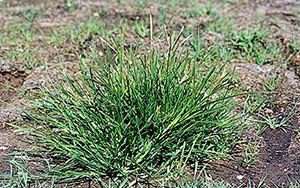Field Guide  Weed Management
Weed Management  Goosegrass
Goosegrass
Goosegrass (Eleusine indica)
Crop Impacts: Turf grass and all crop fields
 | |
About Goosegrass:Goosegrass is a summer annual grass that can sometimes be a perennial plant. It is widespread and can stand up to any weather conditions, except for frost. Goosegrass is prone to cause diseases such as sugarcane mosaic. It is very important to know that even when mowed closely, this type of grass will still produce seeds. However, Goosegrass will only germinate when soil temperature is 15°C to 18°C. Family: Grass family (poaceae) 
Goosegrass Scouting and Prevention:This type of grass can be found in high traffic areas and grows close to the ground. Its main habitats are turf grass, gardens, crop fields and disturbed areas. Goosegrass has fleshy based stems that are pale green in color with a white center and flattened stems. The leaves alternate with jagged tops, along with the entire patch of Goosegrass spreading to approximately 2.5 feet. Goosegrass Control:The best way to control this weed if you do not want to use chemicals on your lawn is to pull them out by hand, and make sure that you maintain grass areas during the spring and summer months. Make sure to increase drainage and avoid too much irrigation, heavy traffic, fertilizing in the summer and close mowing. However, if you are willing to use herbicides on your lawn, Dimension (dithiopyr) works well. It is important to know that when using this particular herbicide, it is volatile under extreme heat and the weed must be watered for several days after treatment if there is no rain. Latin / Alternative Goosegrass names:- - Eleusine indica
- - Wiregrass
- - Silver crabgrass
Additional Goosegrass Resources |
http://www.turf.uiuc.edu/weed_web/descriptions/goosegrass.htm
http://www.turffiles.ncsu.edu/weeds/goosegrass.aspx